CM: Move “To Protect Depositors and Creditors”
Sir K. Dwight Venner: “To Stabilise, Restructure Banks…”
Gov. Scott: “UK Supports Efforts To Address Impact on Banking System”
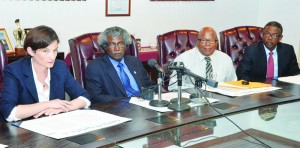
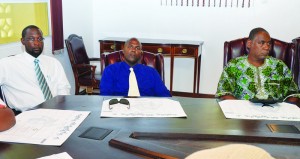

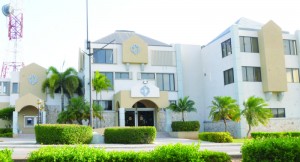
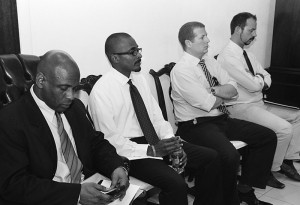
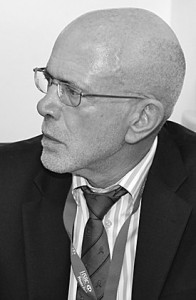
It was announced in Anguilla on Monday, August 12, 2013, that the Eastern Caribbean Central Bank (ECCB) had taken control of the island’s two indigenous banks – the Caribbean Commercial Bank (Anguilla) Ltd (CCB) and the National Bankof Anguilla Ltd (NBA).
The takeover, for six months in the first instance, has the support of the Anguilla Government, the Foreign and Commonwealth Office of the British Government, the IMF and the World Bank. Both international financial institutions are working with the ECCB team of nineteen officials now involved in the operations of CCB and NBA.
The announcement was made during a live broadcast press conference called by the ECCB at 2.00 pm on Monday in the Chamber of the Executive Council. Present at the event were Anguilla’s Governor, Ms Christina Scott; Chief Minister and Minister of Finance, Hubert Hughes; Premier Reuben Meade of Montserrat; Antigua’s Minister of Finance, Harold Lowell; Sir Dwight Venner, Governor of the ECCB and other Central Bank officials; Anguilla’s Minister of Home Affairs, Jerome Roberts; Parliamentary Secretary, Haydn Hughes; and Director of the Anguilla Financial Services Commission, Keith Bell.
The speakers were Chief Minister Hughes, Sir K. Dwight Venner and Anguilla’s Governor, Christina Scott, all of whose addresses are published elsewhere in The Anguillian. Looking at the main points of the addresses, Mr Hughes stated that in recent times there had been great unease about the operations of both banks. The Anguilla Government had become concerned, bearing in mind, that they were the largest financial institutions on the island and together accounted for 76.7 % of the total assets of the banking sector.
He said that as a result of the global economic and financial crisis the island’s major sectors – tourism and construction – had a significant impact on the performance of loans in those sectors. He pointed out that the two banks had been facing various challenges including poor earnings performance, declining assets, high levels of non-performing loans, weak corporate governance and the inability of their management to reverse the situation.
The Chief Minister said the ECCB, the Monetary Council, and the Ministerial Sub-Committee on Banking, after representations by the Anguilla Government, decided to invoke Part llA, Article 5B of the ECCB Agreement Act 1983, thus giving the ECCB the power to take control of the banks.
“This step has not been taken lightly, and exhaustive steps have taken place with the Foreign and Commonwealth Office of the British Government and they too have concurred with this action,” he stated. Mr Hughes added that the British Government and the ECCB would ensure that the relevant measures are put in place to protect the interests of depositors and creditors and to return the banks to a state of normalcy.
Sir Dwight Venner explained the circumstances under which control of the operations of the banks were taken over as follows:
The economies of the Eastern Caribbean Currency Union (ECCU) are mainly dependent for their growth on two sectors: tourism and construction; the global crisis has had a major impact on these sectors; growth in Anguilla had virtually collapsed, falling from an average of 15.8 per cent between 2005 and 2007 to an average contraction of 5.5 per cent for the period 2008-2012; and the banks have seen their non-performing loans escalate to levels beyond the guidelines set by the Central Bank – and this has resulted in the banks not meeting their capital requirements.
Sir Dwight further explained that the objective of taking control of the banks was intended to stabilise and restructure both banks and return them to a state of normalcy; to protect depositors and creditors; and to ensure the stability of the banking system in Anguilla and, by extension, the entire Currency Union.
Governor Scott assured the people of Anguilla that the British Government was in support of the ECCB and the Monetary Council in taking control of the banks to ensure the stability of the banking system in Anguilla.
She said that the action was “in the best interest of all parties as we go about the business of maintaining the normalcy of these banks.” The Governor added that the task was “in the hands of experienced professionals from the ECCB, the IMF and the World Bank” in whom the British Government, and her, had every confidence.
With the taking over the banks, the Boards of Directors of both banks have become dysfunctional and some of the top management personnel have been relieved of their services. The two banks are continuing to function as usual with customers performing their normal banking transactions.
Similar action to take control of commercial banks was carried out by the ECCB some time ago in Montserrat and Antigua.







